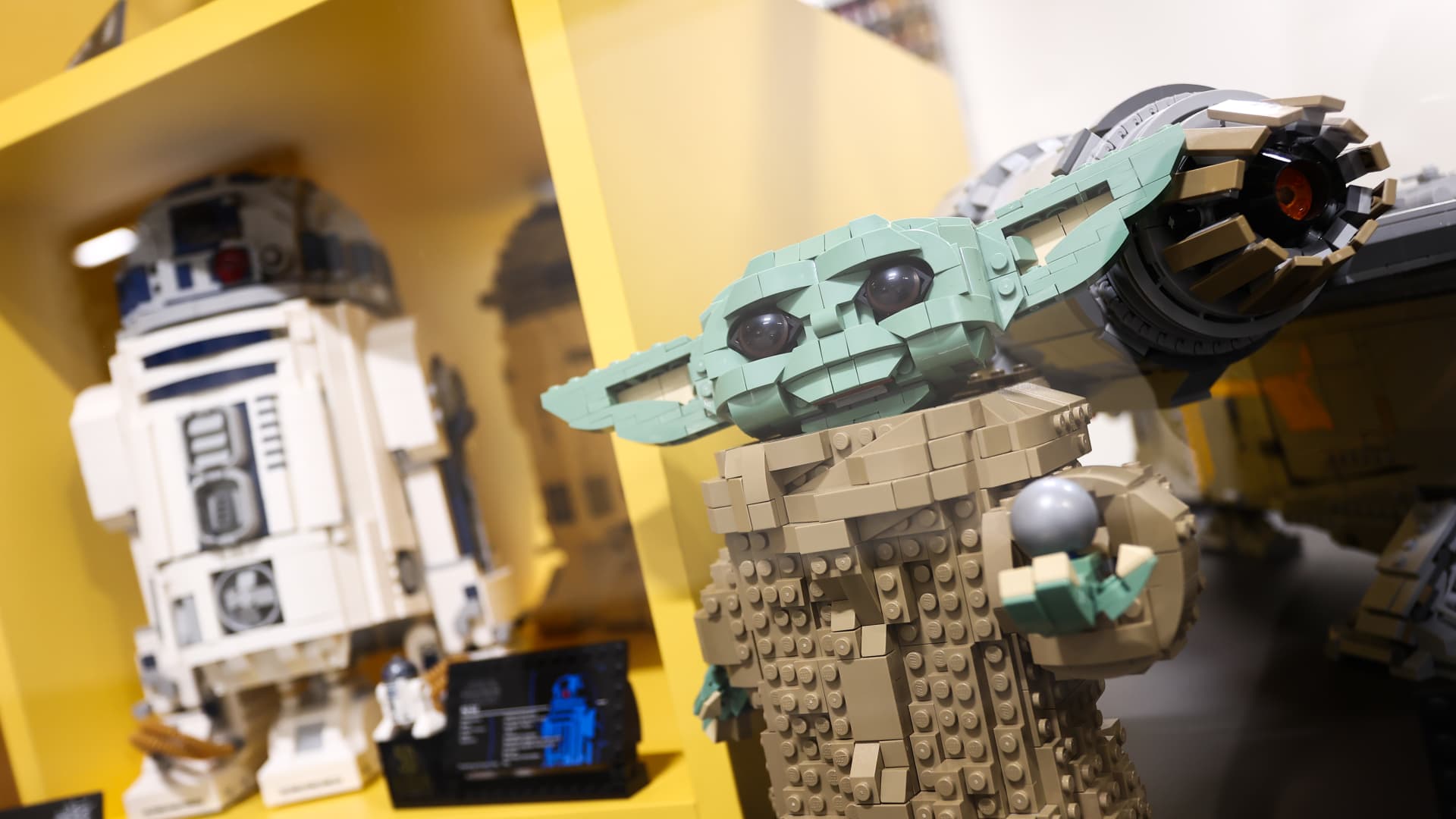
Margot Robbie is Barbie in Warner Bros.’ “Barbie.”
Warner Bros.
If there’s one thing Mattel CEO Ynon Kreiz wants shareholders to take away on Thursday, it’s the power of Barbie.
As the toymaker faces activist pressure from Barington Capital, particularly around its strategy with the Fisher-Price and American Girl brands, it’s putting forth Barbie as a blueprint of what’s possible at the toy company, with an investor presentation Thursday.
“Our job is to take these timeless brands and make them timely,” Kreiz told CNBC ahead of the presentation.
Since taking the helm of Mattel in 2018, Kreiz has initiated a turnaround plan for the company that has seen the revival of major brands, including Barbie, and a 44% increase in share price. He’s touted the Mattel “playbook,” the company’s strategy for taking beloved franchises and making them available to consumers across multiple segments.
With “Barbie” — the eponymous film, directed by Greta Gerwig and nominated for eight Oscars this year — that plan has come to fruition.
“The idea was to find ways to create multiple touch points, to build strong toy brands,” said Kreiz. “And once you have the established fan base and cultural resonance around brands, this is where you extend them to other experiences, other products, other opportunities to connect with your fans.”
“The ‘Barbie’ movie was really a manifestation of that very much a showcase of how we think about the opportunity in front of us,” he said.
Gerwig’s “Barbie” generated nearly $1.5 billion at the global box office by tapping into pop culture relevance — both the reverence and revulsion for the toy brand felt by consumers for more than six decades. The film’s success led to around $150 million in related toys and consumer products sales, like sweatshirts emblazoned with the phrase “I am Kenough” and Mattel’s share of the movie ticket proceeds.
“We’re now thinking of people who buy our products not just as consumers but as fans,” Kreiz said.
Starting in July, the movie will go on a 37-city tour to different music venues, accompanied by the Sinfonietta, an all-women’s orchestra. And then there’s this Sunday’s Academy Awards, for which “Barbie” is nominated for acting awards, best original song, best costume design and best picture, among others.
“Whether we’re talking about products, entertainment, television, music, publishing, digital gaming, all of it we’re creating an ecosystem of true franchise flywheel,” said Josh Silverman, chief franchise officer at Mattel.
Following in Barbie’s footsteps
While Kreiz has acknowledged that future film and television projects may not reach the same lofty heights as the Margot Robbie-led flick, he noted that “Barbie” offers a template for expanding Mattel’s intellectual property outside of the toy aisle.
“It’s not whether our brands resonate outside of stores,” he said. “Because they do. We’ve proven it. It’s whether we can do it because we are doing it and we have been executing very successfully. It’s about doing it at scale.”
This is especially important for the company’s Fisher-Price and American Girl brands, which have been in the midst of their own transformations for several years.
A combination of changing consumer purchasing habits and the disappearance of Toys R Us led to significant sales declines for both brands in recent years. In just the last year, net global sales for American Girl were down 9%. For the company’s infant, toddler and preschool segment, which includes Fisher-Price, sales were down 10%.
Activist investor Barington Capital wrote a letter to Kreiz ahead of the company’s February earnings report that said it believes “these brands are now detracting from the success at Mattel’s other segments, and hurting shareholder value.”
Mattel, however, still sees value in continued investment in these brands and had already begun efforts to revitalize American Girl and Fisher-Price prior to the activist investor’s February letter, Kreiz said.
American Girl was seeing sales weaknesses even before the pandemic forced retail locations to shutter. Copycat dolls that looked like the iconic American Girl dolls packed shelves for a fraction of the price, and the once-alluring experiential shopping associated with the brand’s flagship stores had dissipated.
While American Girl dolls can be purchased online, e-commerce hadn’t historically been Mattel’s main strategy. Much of its marketing was put toward promoting retail stores with their cafes and doll hair salons and its mailed catalog.
The American Girl brand did emerge from the pandemic leaner, with fewer retail locations, a bigger push for direct-to-consumer online shopping and a renewed focus on modernizing its dolls for a new generation. Sales in 2021 even rose 5%. However, they fell again in both 2022 and 2023.
When it comes to to the American Girl brand, Kreiz admits that the challenges “were not product driven,” but rather an issue with its commercial strategy.
He said the brand will see growth in its flagship stores, more product innovation and expanded licensed entertainment going forward, including a partnership with Disney princesses and a film project with Paramount.
American Girl doll by Mattel
Source: Mattel
“We think there’s some real opportunities to continue to grow the brand and extend the story that exists within American Girl thoughtfully, and we want to do it authentically,” said Silverman. “The franchise is very much the bridge between toys and entertainment.”
Mattel executives remained tightlipped about what to expect from an upcoming American Girl movie, which currently does not have a release date.
“We’re working closely right now with a writer to unlock that story,” said Lisa McKnight, Mattel’s chief brand officer. “We believe it will be a great opportunity for the brand when the film comes out.”
Where Fisher-Price fits in
Amid a slew of film projects, including a Hot Wheels flick with with J.J. Abram’s Bad Robot, a Major Matt Mason movie starring Tom Hanks, and a Lily Collins-led Polly Pocket film, written and directed by Lena Dunham, Mattel is revamping several of its preschool entertainment properties.
Starting this fall, the company is relaunching Barney with an animated series, with a product line to follow in 2025. Marc Forster (“Quantum of Solace” and “Finding Neverland”) has also been tapped to direct and produce a film based on the Thomas & Friends franchise.
“We’re going to evaluate, curate, incubate and relaunch properties in the preschool space with a full franchise capabilities,” Silverman said.
These brands fall within Mattel’s billion-dollar infant, toddler and preschool division, in which the company has been trimming fat and emphasizing innovative ways to grow over the last few years.
“It’s a big business, and it’s a complex business,” said McKnight. “And, so, what we’ve done over the past few months is really gotten under the hood and acknowledge that there’s sort of two fundamental aspects. There’s the core of the business, which is for infants and toddlers, [where] parents are really the the purchasers. And then there’s a preschool entertainment business. This is really driven by kid demand and fueled by content.”
Fisher-Price makes up the bulk of the total division, contributing around 70% to 80% of the division’s revenue annually. In 2023, net sales for Fisher-Price were around $850 million, a 9% drop from the year prior.
Weighing heavily on Fisher-Price are two segments that Mattel is actively exiting — Power Wheels, battery operated ride-on vehicles, and baby gear. Kreiz said Mattel doesn’t have a “unique advantage” when it comes to these items and faces steep competition for market share. He also noted that much of the losses in the infant, toddler and preschool division were driven by those exits.
Meanwhile, Mattel is working to bring more innovative product to the more than 90-year-old brand, even tailoring the color and material of children’s developmental toys to be more “aesthetically attractive” to younger parents.
“We’re starting to look at the fabric choices and the color palettes for those items … that work nicely with with home decor,” McKnight said, noting that millennial parents often want baby toys that better match their interior decorating styles.
Mattel is also introducing a new line to the Fisher-Price portfolio of wood toys, launching exclusively at Walmart in North America this spring and globally in the second half of 2024.
“It’s a good looking product that people feel good having out in a display, and it’s made from sustainable materials which will also which is also very important to this customer,” McKnight said.







